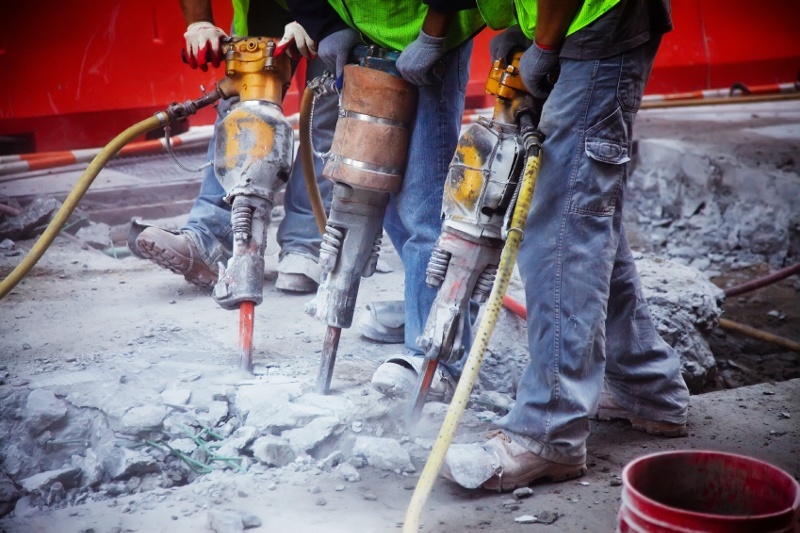Working with vibration tools such as pneumatic drills and hammers, compactor plates and industrial grinders can place people at high risk of developing a repetitive strain injury (RSI).
Pneumatic drills, which are often known as jackhammers, are used to break up concrete, rock or pavements and are a regular site on construction sites everywhere. They can cause RSI and, in particular, white finger, carpal tunnel syndrome or Renaud’s disease, because of the sheer force they place on the user. The machines are heavy and, because they usually run on compressed air and have to break through extremely hard surfaces, require strong arms to wield effectively.
Like jackhammers and pneumatic drills, plate compactors place construction workers at risk of contracting RSI. These machines are often very heavy and are used to smooth out rough surfaces. The vibrations caused by the resistance of the compactor against the stones and rock they crush, coupled with the repetitive nature of operating them, exposes users at risk of upper limb injuries and musco-skeletal disorders.
Vibration tool injuries are thought to affect tens of thousands of workers in the United Kingdom every year. The vibration from these tools typically causes damage to the nerves, muscles, blood vessels and joints after prolonged use. Vibrations of between 5 and 2,000 Hz are not uncommon in many pneumatic drills, compactor plates and grinders although it only takes as little as 150 Hz for strains to start. Cold weather conditions can exacerbate symptoms too.
Some conditions such as white finger are classed as occupational illnesses, and are known as hand arm vibration syndrome (HAVS) or vibrational white finger (VWF). They can often take many years to surface and, in some cases, symptoms don’t manifest themselves for decades. Those with HAVS or VWF exhibit whitening of the fingers when exposed to the cold, tingling and loss of sensation in the fingers, a reduction in light touch capabilities and strength in the fingers, occasional pain and cold sensations in the fingers, and sometimes develop cysts in the fingers and wrists.
Workers are now protected by The Control of Vibration at Work Regulations 2005 and employers have a duty of care to protect their employees from the damaging side effects of using vibration tools.
It’s not just limb disorders that are caused by vibrating tools. Pneumatic machines are incredibly noisy and can lead to ear damage with long term usage. Tinnitus and industrial deafness are common complaints among road workers, and even wearing ear defenders and plugs is no guarantee of protection.
Like other RSI conditions, taking regular breaks, varying the way the task is carried out and periods of rest can help heal the damage that’s been done. Treatment can help it clear up but continued exposure will make things worse.
If you are – or have been – a construction worker and believe you may have developed RSI as a result, we can help you. Please call our dedicated helpline today on 0800 028 2060 or contact us online here. More information can be found at www.repetitive-straininjury.co.uk.

